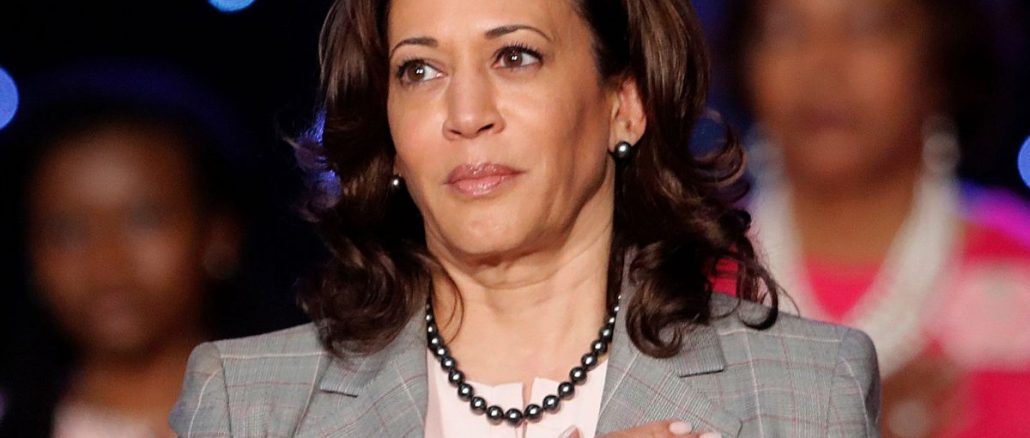
On Wednesday, Sen. Kamala Harris is reintroducing the Maternal Care Access and Reducing Emergencies (CARE) Act, which seeks to tackle the nation's crisis of maternal mortality among Black women by addressing racial discrimination in the healthcare industry, Refinery29 has learned. Rep. Alma Adams is introducing a companion measure in the U.S. House of Representatives.
"Black mothers across the country are facing a health crisis that is driven in part by implicit bias in our healthcare system. We must take action to address this issue, and we must do it with the sense of urgency it deserves," Harris told Refinery29. "My Maternal CARE Act will establish implicit bias training throughout the medical profession and help ensure that women — especially Black women — have access to comprehensive, culturally competent care."
The United States has the highest maternal mortality rate in the industrialized world. Research has shown that between 700 and 900 women die from pregnancy- or childbirth-related causes every year, while around 65,000 come close to dying. According to the Centers for Disease Control and Prevention (CDC), three in five pregnancy-related deaths in the U.S. are preventable. Black and Indigenous women specifically are three to four times more likely to die before, during, and after childbirth than white women.
Harris' bill creates two grant programs to make sure that women, specifically women of color, have access to culturally competent, holistic maternal care, which could help reduce morbidity and mortality. The first grant allocates $25 million for medical schools, nursing schools, and other health-related professional training programs to address implicit bias, a key reason Black women specifically receive subpar healthcare. To this day, many health providers continue to believe, without any scientific basis, that Black people have a higher threshold for pain. When combined with the stress of racism and the dismissal of their symptoms, Black women are much more vulnerable to facing life-threatening conditions or death during childbirth — regardless of factors such as income and education. Serena Williams has talked often about how her doctors dismissed her concerns after the birth of her daughter Alexis Olympia and the complications almost killed her. Beyoncé and Olympian Allyson Felix have had similarly harrowing experiences, despite having access to some of the most high-quality healthcare available.
The second part of Harris' bill would allocate $125 million to establish pregnancy medical home (PMH) programs, which would connect women facing high-risk pregnancies with case managers who help them coordinate health and social services. The grant initiative is modeled on a successful program in North Carolina. The measure also aims to help medical schools teach and test for bias recognition in clinical skills, with the National Academy of Medicine researching and making recommendations on how to address this issue.
Monifa Bandele, senior vice president and head of maternal justice campaigns at MomsRising, highlighted how crucial it is for healthcare professionals to receive trainings against racial bias and for legislation to incentivize these steps. "As we continue to see women’s access to healthcare come under attack, it’s more important than ever to elevate the voices of those most impacted — Black women. When it comes to maternal health, Black women are three to four times more likely than white women to die from pregnancy-related complications, largely due to implicit bias and racism in our healthcare system,” she told Refinery29.
Bandele added: "We are glad that [Harris] and other lawmakers are putting forward proposals to address this crisis and focus on the disparities. If our leaders truly care about the lives and healthcare of their constituents, they will follow Sen. Harris’ lead and turn this bill into law."
The issues of maternal mortality and morbidity have been in the spotlight over the past few months. In late March, Rep. Robin Kelly, Sen. Dick Durbin, and Sen. Tammy Duckworth introduced the Mothers and Offspring Mortality and Morbidity Awareness (MOMMA’s) Act. Soon after, Adams and Rep. Lauren Underwood launched the first Black Maternal Health Caucus in the history of the U.S. House of Representatives. In early May, Sen. Cory Booker and Rep. Ayanna Pressley introduced legislation to expand Medicaid coverage for pregnant women and new mothers. Sen. Elizabeth Warren also recently unveiled a plan to address this crisis as part of her 2020 presidential platform.
Click HERE to read more.
You can publish this article on your website as long as you provide a link back to this page.

Be the first to comment